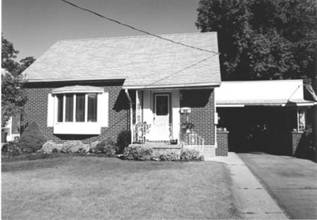Two separate paths came together.
One path started at a farm near the Pioneer Tower, by our Grand River.
The other path started in England…then crossed the ocean to end up at our Cambridge.
The two paths came together in 1970 when the country fellow, Gary, met the city girl, Marie.
That is a very quick summary of how the second generation of the Pioneer Craftsmen family business came about. Gary Adam’s father, Ken Adam, started the company in 1953 when he transitioned from farming to building and home renovations.
In 1972 Marie and Gary married and they had two sons, Jamie and Jeff. Jamie chose to work at the family business. Jeff is a teacher in Kitchener.
Since the 1970’s Gary and Marie have worked together, building the family business. Their grounding forces were hard work, care for clients, and an ability to read the market.
That’s the solid ground Pioneer Craftsmen has been built on for over 30 years.
Marie summed it up this way, “If you don’t treat your clients well and give them more than they expect then you are not going to be successful in business”.
That way of thinking existed from the start, when Ken Adam created the business. Ken is fondly remembered as a man who was “light on talk and heavy on walk”. Ken was a family-business role model for Gary and Marie and also their son Jamie who became President of the family business in 2009.
Marie and Gary are a close couple: they credit one another for providing long-term support…good sounding boards for one another…and helping one another see the big picture. And, it’s also important to have fun…that’s key to survival.
That’s strong fabric for a family business!
Gary and Marie Adam
Sharing fond memories…
When asked about fond memories, Marie smiled and told the story of her teenage son, Jamie, making his way to and from job sites on his bicycle during the summer. This started in 1988 when Jamie was 14 years old. “It was expected he find his way. He never asked for a ride”.
Then, another broad smile as Mom admitted – “I did drive him once in a while when it was pouring rain”.
Jamie, the 3rd generation Pioneer Craftsmen Adam, studied and worked through the roles of labourer, office, sales, and General Manager before earning the role of President.
A long-time employee, Paul Meier, also worked his way up from on site roles to Sales Manager. Paul is now part owner of the company.
Paul and Jamie will be the guiding forces as Pioneer Craftsmen steps toward its exciting future.
Jamie Adam & Paul Meier
“Poised to take Pioneer Craftsmen to the next level!”
Marie’s story continued…
“Our son…watching the progression from bicycles and summer jobs to earning the job of company President…that’s our proudest family-business memory”.
***
Pioneer Craftsmen works out of its new home at 1510 Victoria Street North, Kitchener.
The Pioneer Craftsmen team, at their new Kitchener work place.
Pioneer Craftsmen is proud of the strong client relationships it has built.
Here is a sample to explain what that means: in the early 1980`s Pioneer Craftsmen did a project for a client in Guelph. During a recent visit this client mentioned to Gary that Pioneer Craftsmen became part of the family during that renovation. That’s why they have chosen Pioneer Craftsmen to do all renovation work over a period of almost 30 years and 22 projects.
When clients consider you part of their family…that’s business excellence!
And that is one of the stories Jamie, Paul, Gary, and Marie use to help their team understand their company’s client relationship goals.
A couple of samples of the impressive work Pioneer Craftsmen is doing at our community:
 |
 |
| Before Pioneer Craftsmen magic |
After Pioneer Craftsmen magic |
 |
 |
| Before Pioneer Craftsmen magic |
After Pioneer Craftsmen magic |
Awesome work!
Family: that’s the starting point for a family business.
And, it is the ending point for this Family Business Success Story.
Marie and Gary Adam enjoy 4 grandchildren: Marcus, Johnathan, Maddy, and Kaylee.
Here’s a picture of Marie & Gary, their sons Jamie & Jeff and their sons` families…having fun!
Congratulations to a fine local family and a fine local family business!